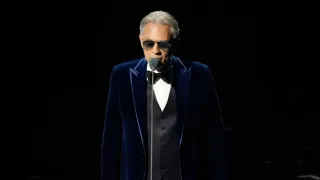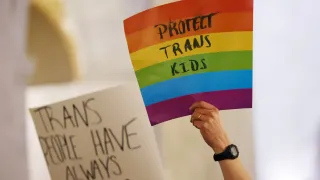June 13, 2023
Review: Henry Hoke's 'Open Throat' a Unique and Powerful Read
Tim Pfaff READ TIME: 5 MIN.
There's such sinewy, feral strength in the voice that powers Henry Hoke's new novel, "Open Throat" (MCA/Farrar, Straus & Giroux) that the voices both promoting and commenting on it to date have not had to deploy the prevailing nostrum of the day, "genre-bending." The novel is sui generis, literally in a class of its own.
The unnamed first-person narrator is a queer mountain lion living under the Hollywood sign in the hills of what they call "ellay." This is no cuddly kitty, but our canny cougar is an engaging storyteller the reader is inclined to believe, if not rescue.
"Open Throat" is hardly the first work of fiction to view the human world through the eyes of an animal, nor the first to imply that animals are really better people than people. The cougar's observations of human behavior are at once scathing and dismissive, but in no time the reader is solidly on the cougar's side.
Pride of Lion
What makes the novel work is that it hews more to the style of a fable than the strangely more limiting parable. The reader will, largely, relate to the animal's horror at what man has made of his shared physical environment, but the harshest assessments are typically presented with a disarming charm.
Hoke leads with a sentence many another writer would die for.
"I've never eaten a person but today I might."
The forces that drive the cat's passage through the urban hellscape – insatiable hunger and unquenchable thirst – could hardly be more basic. Regarding the world with equal parts bafflement and harsh judgment, the beast experiences drought-stricken "ellay" as both predator and prey. Even their summary judgments are disarmingly simple. "I try to understand people but they make it hard."
Hoke does not overwork his creature's queerness. Even the most assiduous book banners might have to have the sexuality issues pointed out to them. There are clear indications that the cougar is anatomically male; they have "dangling parts" like those of the man who pisses on them, initially unaware of the danger afoot. There's an erotic component in sharing a meal with an accommodating fellow predator. The violence the cat sees in the world echoes the life-threatening violence of their own father.
The cat's essential queerness allows them to regard examples of the same-sex rites they witness with a kind of knowing wonder. Fascination with two boys walking hand in hand comes with an unmistakable warmth. There's something more sinister in the cat's account of two men going into a cave together, having sex (perfectly told with the insights of a quadruped, which gets around the inherent traps of sex writing), and then leaving the cave separately. Outdoorsy gay men will understand.
Modern-day Perils
There's tenderness in the cat's protection of a group of otherwise-homeless tent dwellers – "my people" – whose fragile existence is imperiled by a man-made fire. At the other extreme of the critter's emotional arc is an obsession with a man assaulting a couple with a whip. The telling detail Hoke employs is the cat's obsession with the bulging vein in the man's neck, which infiltrates the whole novel and sets the stage for one last kill. The man with the thick neck is reduced in the final pages to the Open Throat of the title.
Much of what the lion sees reflects concerns of their human counterparts. At a time when smoke from the north looks to imperil all of the continental U.S., Hoke's depictions of the real fires that menace the region are at the least disconcerting. It's distressing when the lion quips, "fire is the only future."
A reader initially puzzled by the lion's reference to the "long death" is struck by the eventual realization that it identifies the freeway. Similarly, there's "green paper" for money (both what it can and cannot do for you).
When the lion overhears hikers speaking of scarcity, what he hears instead is "scare city." "There's something wrong with my ears," they say. "I can't shut them like I can my eyes."
Is the Apostrophe Punctuation?
The novel unfolds in a fast-paced series of short chapters composed of sentences that seldom run to more than five lines. There is no capitalization, and the only punctuation mark used is the necessary apostrophe. Amazingly, that never becomes wearying.
What the style permits is the occasionally blazing line:
"The burn is behind me but the smoke is everywhere."
The "wall of metal poles" points to the Los Angeles Zoo.
"I expect the animals I smell to be impaled here too.... alive this time not fake alive and dripping blood that I can lick and lick from the metal."
The cumulative power of Hoke's short sentence fragments makes for "paragraphs" as disturbing as these:
"I'll show you a predator
beyond a murky green pond that even I won't drink from my nostrils catch an irresistible scent
small and sick and afraid
three of my favorite flavors."
When the lion attracts the attention of an innocent young girl, she says "good morning heckit," and they puzzle over the name she has given them.
"heckit
I'll take it
I can't tell her my real one
my mother gave it to me when she first saw me lick blood off my lips
it's not made of noises a person can make."
What makes the novel such a compelling read is precisely Hoke's uncanny ability to conjure noises no person can make with customary words magically recombined.
"Open Throat" is Hoke's first novel published by a major publisher, but it's his fifth book. This being Pride Month and all, it seems only right to tip the hat to Farrar, Straus & Giroux. Its MCD division has led to the publication of several books, like this one by queer authors with singular visions that would otherwise not seen the light of day.
"Open Throat," by Henry Hoke. www.fsgbooks.com|www.fsgbooks.com|MCA/Farrar, Straus & Giroux, 161 pp., $25.
Help keep the Bay Area Reporter going in these tough times. To support local, independent, LGBTQ journalism, consider becoming a BAR member.






